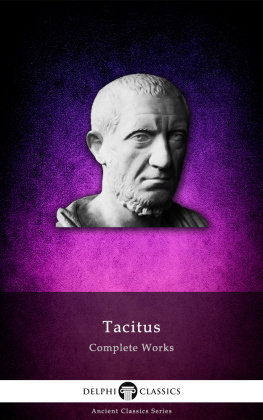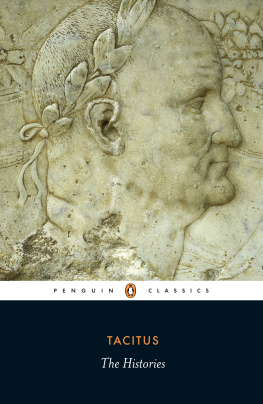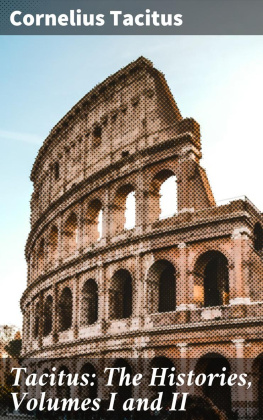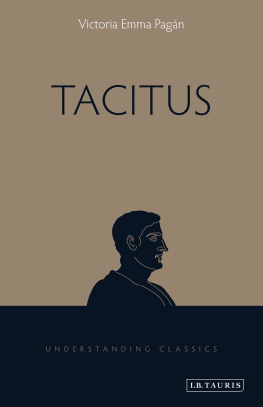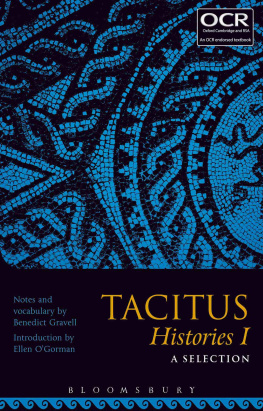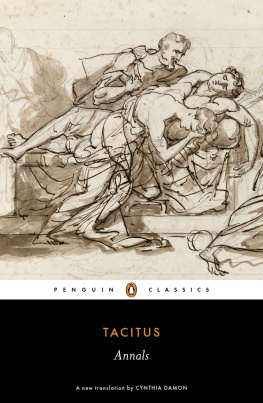Tacitus - The Annals & the Histories
Here you can read online Tacitus - The Annals & the Histories full text of the book (entire story) in english for free. Download pdf and epub, get meaning, cover and reviews about this ebook. year: 2007, publisher: Modern Library, genre: Non-fiction. Description of the work, (preface) as well as reviews are available. Best literature library LitArk.com created for fans of good reading and offers a wide selection of genres:
Romance novel
Science fiction
Adventure
Detective
Science
History
Home and family
Prose
Art
Politics
Computer
Non-fiction
Religion
Business
Children
Humor
Choose a favorite category and find really read worthwhile books. Enjoy immersion in the world of imagination, feel the emotions of the characters or learn something new for yourself, make an fascinating discovery.

- Book:The Annals & the Histories
- Author:
- Publisher:Modern Library
- Genre:
- Year:2007
- Rating:5 / 5
- Favourites:Add to favourites
- Your mark:
- 100
- 1
- 2
- 3
- 4
- 5
The Annals & the Histories: summary, description and annotation
We offer to read an annotation, description, summary or preface (depends on what the author of the book "The Annals & the Histories" wrote himself). If you haven't found the necessary information about the book — write in the comments, we will try to find it.
The Annals & the Histories — read online for free the complete book (whole text) full work
Below is the text of the book, divided by pages. System saving the place of the last page read, allows you to conveniently read the book "The Annals & the Histories" online for free, without having to search again every time where you left off. Put a bookmark, and you can go to the page where you finished reading at any time.
Font size:
Interval:
Bookmark:

Table of Contents
TACITUS
Cornelius Tacitus, widely regarded as Romes greatest historian, was born circa 55 A.D. in, most probably, Narbonese Gaul or Cisalpine Gaul. The details of the rest of his life are similarly obscure, and the few details we know for certain are inferred from his writings, particularly his correspondence with his friend Pliny the Younger, the politician and famous epistolary writer. His literary style and reputation as an orator point to an excellent education, and it is safe to assume, given his advantageous marriage, his successful public career, and his aristocratic indifference to the affairs of the lower orders, that his family was wealthy and well connected, if not necessarily noble.
Tacitus came to Rome around 75 A.D. to begin his public career, and in 78 A.D. he married the daughter of Gnaeus Julius Agricola, who served as governor of Britannia from 77 to 84. Her name is not known. It is certain that Tacitus served as praetor in 88 A.D. and that he had by that time been enrolled as a member of the quindecimviri sacris faciundis, one of Romes most august priestly colleges, whose primary function was the caretaking of the Sibylline oracles. From 89 to 93 A.D., Tacitus was absent from Rome, presumably serving in some official capacity in the provinces, and while he was away, his father-in-law died. There is no further information about Tacituss political career until he achieved the highest political office, in 97 A.D., when he was elected suffect consul.
Despite Tacituss claim to being a writer without anger or zeal, it is clear that a childhood begun during Neros reign of terror and a public career whose apex was achieved under Domitians tyranny greatly informed his writing. The climate in Rome under Domitian was hostile to publishing works in any way critical of the empire, and it was not until after Domitians death, in 96 A.D., under the enlightened rule of Nerva and Trajan, that Tacitus began his literary career. Looking back on the reigns of despotic and oppressive emperors while enjoying the rare happiness of times when we may think what we please, and express what we think, Tacitus brought forth the twin themes of republican virtue and imperial corruption that he was to visit throughout his writing.
Tacitus published his first two important works in 98 A.D. One was the Agricola, a panegyric to his recently deceased father-in-law. Though the biography concerns itself primarily with a governorship that proved Agricola one of the most capable generals and administrators of his time, it also contains pointed criticism of Domitians reign as an era blind and hostile to goodness. The Agricola was followed immediately by another short work, the Germania, a monograph describing the history of the Germans and the different customs of various German tribes. Though the bulk of the Germania is ethnographic, there are frequent comparisons between German and Roman culture, in many cases idealizing the Germans as a contrast to the failures of Rome.
Tacituss greatest works are his histories of the Roman Empire, published in reverse chronological order, neither of which survives intact. The Histories, published around 109 A.D., began with the reign of Galba, in 69 A.D., and concluded with the death of Domitian, in 96 A.D. Of the original fourteen books, only Books IIV survive complete, along with the beginning of Book V, ending the narrative in 70 A.D., the second year of Vespasians reign. The second history, the Annals, published around 116 A.D., is without question the culmination of Tacituss genius as a writer and historian. It is in the Annals that his utterly unique writing style, characterized by compressed, direct sentences, powerful innuendo, and austere diction, achieves its greatest expression. The Annals began with the death of Augustus, in 14 A.D., and concluded in 68 A.D., the year of Neros suicide. Of the original eighteen volumes only Books IIV and XIXV remain intact. Along with scattered fragments of other books, they chronicle parts of the reigns of Tiberius, Claudius, and Nero. In both of his histories, Tacitus shows himself to be a harsh critic of tyrannical rulers and a corrupt empire by repeatedly revisiting republican virtue and the great achievements of the republic, in contrast to the decay and degeneration of the empire.
Though Tacitus held no office that we know of between his consulship and the publication of the Histories, a span of nearly twelve years, his political career was crowned in 112 A.D. by an appointment to the proconsular governorship of Asia, the most coveted of the senatorial provinces.
Though Tacitus tells us in the first chapter of the Histories that, if his life proved long enough, he intended to chronicle the more peaceful reigns of Nerva and Trajan, he was never afforded the opportunity, and his death can be dated to no later than 117 A.D.
INTRODUCTION
Shelby Foote
Cornelius Tacitus, the greatest Roman historian, was born soon after 55 A.D. in Cisalpine Gaul (northern Italy or the south of France) and died not long before 120. His first historical composition was published in 98, when he was just past forty, thus affording him a writing life of about two decadeslong enough, as events developed, for him to earn the fame now granted him throughout the literate world. Thomas Jefferson, for example, considered his works as pre-eminent specimens of logic, taste, and that sententious brevity which, using not a word to spare, leaves not a moment for inattention to the hearer, then capped this climactic praise, in advice to his granddaughter on the reading she should undertake, with the blurb to end all blurbs: Tacitus I consider the first writer in the world without a single exception. His book is a compound of history and morality of which we have no other example.
Such an assessment was a long time coming. From the fifth through the fifteenth century he was scantly mentioned and his work was scarcely known. He evidently had, for his upbringing, the advantages due a privileged family, including a superior education. He married young and well, in 78, the daughter of the Roman governor of Britain. A member of the five-hundred-man Senate a decade later, soon after he reached the required age, he served as consul under Nerva in 97, as governor of Asia Minor under Trajan in 112, and perhaps held the same office under Hadrian after 116.
As for his authorial career, it began with three comparatively brief but already maturely written trial flights: the Agricola in 98, a panegyric on his distinguished father-in-law, dead five years by then; the Germania, published in tandem that same year, an ethnographic and political study of the tribes beyond the Rhine; and the Dialogue on Oratory in 102, composed in a foregone style that caused many commentators to identify it as juvenilia. Then came the two works, included here, on which his lofty reputation rests. The Histories cover Rome and its provinces from 69 to 96, Galba to the death of Domitian, and the Annals back-tracked to 1468, Tiberius through Nero. Both survive, as luck would have itroughly one-third of the former and half of the latterin truncated and mutilated copies found, well into the Renaissance, in Italian monasteries at Hersfeld and Monte Cassino, fortunately some four hundred years before American artillery did its level best to destroy the latter place.
The thousand-year delay before he was widely read, either in his native tongue or in translation, was due in part to his unchurchly disregard for Jews and Christians, which provoked the authorities controlling wrath throughout the Middle Ages, and in part to the rarity of biographical information, so severe that even today we do not know whether the first of his three names was Publius or Gaius (one of two rare sources gives one, the other gives the other) and even toward the end of that long obscurity he is referred to vaguely, by a sixth-century writer, as a certain Cornelius. What survives is the workthe writingand that eventually overcame the proscription, at least in regard to his outlook and his nature, which is reflected vividly in nearly every line he wrote.
Font size:
Interval:
Bookmark:
Similar books «The Annals & the Histories»
Look at similar books to The Annals & the Histories. We have selected literature similar in name and meaning in the hope of providing readers with more options to find new, interesting, not yet read works.
Discussion, reviews of the book The Annals & the Histories and just readers' own opinions. Leave your comments, write what you think about the work, its meaning or the main characters. Specify what exactly you liked and what you didn't like, and why you think so.

